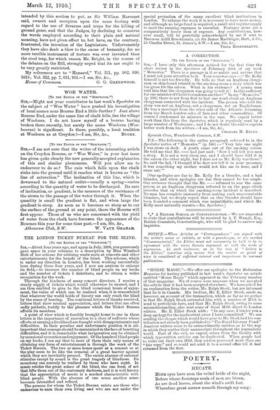TM, LONDON TICKET BUREAU . FOR THE BLIND. L're THE EDITOR
OF THE "SPECTATOR."] SIR,—About four years ago, and again in July, 1908, you generously gave space in your columns to a description by Miss Winifred Holt of her scheme for utilising waste seats at concerts and other entertainments for the benefit of the blind. This scheme, which is under my direction in London, has been working successfully here during these four years, and I now am anxious to enlarge its field,—to increase the number of blind people on my books and the number of tickets I distribute, and to obtain a wider recognition for the work.
Through the kindness of many concert directors, I receive a steady supply of tickets which would otherwise be unused, and I am thus enabled to give to the blind occasional hours of enjoy- ment, the value of which can be realised when it is remembered that whatever the world holds of beauty can only reach the blind by the sense of hearing. The continual letters of thanks received, letters that show musical appreciation, and letters that are often sadly pathetic, testify to the pleasure which the Ticket Bureau affords its members.
A point of view which is forcibly brought home to one in these letters is the importance of recreation to a class of sufferers whose efforts at earning a livelihood are fraught with disappointments and difficulties. In their peculiar and unfortunate position it is all- important that courage should be maintained in the face of besetting difficulties, and it is remarkable what invigoration can be obtained by occasional recreation and enjoyment. Of the hundred blind people on my books, I can say that to most of them their only means of obtaining any form of entertainment is through the work of the Ticket Bureau. The two or more hours spent at a concert or at the play seem to be like the removal of a great barrier against which they are inevitably pressed. The entire absence of external stimulus except by sound is the great tragedy of blindness. Its monotony can scarcely be realised by those who have sight. In music resides the great solace of the 'blind, the one form of art that lifts them out of the customary darkness, and it is well known that the appreciation of music is a marked characteristic with blind people. With the absence of one sense another sense becomes intensified and refined.
The persons for whom the Ticket Bureau exists are those who endeavour to earn their own living and who are not under the
special protection of the many excellent blind institutions in London. To enlarge the work it is necessary to have more money, and although no large fund is required, a small and regular supply to meet the running expenses is essential. Postages alone are a comparatively heavy item of expense. Any contributions, how- ever small, will be gratefully acknowledged by me if sent to Baroness Arild Rosenkrantz, dio Sir James MacGrigor, Bart., & Co., 25 Charles Street, St. James's, S.W.—I am, Sir, &c.,
TESSA ROSENKELANTZ.














































 Previous page
Previous page